| Article ID | Journal | Published Year | Pages | File Type |
|---|---|---|---|---|
| 10107588 | International Journal of Food Microbiology | 2005 | 11 Pages |
Abstract
Commercial allyl isothiocyanate (AIT) was examined for its ability to reduce numbers of Escherichia coli O157:H7 inoculated in fresh ground beef packaged under nitrogen and stored refrigerated or frozen. A five-strain cocktail of E. coli O157:H7 containing 3 or 6 log10 cfu/g was inoculated into 100 g ground beef and formed into 10Ã1-cm patties. A 10-cm diameter filter paper disk treated with AIT suspended in sterile corn oil was placed on top of a single patty. One patty and paper disk were placed in a bag of Nylon/EVOH/PE with O2 permeability of 2.3 cm3 mâ2 24 h atm at 23 °C. The bags were back-flushed with 100% nitrogen, heat-sealed and stored at 10, 4 and â18 °C for 8, 21 or 35 days, respectively. During storage, the AIT levels in the package headspaces were determined by gas liquid chromatography, and mesophilic bacteria and E. coli O157:H7 were counted. The mesophilic aerobic bacteria in ground beef patties were largely unaffected by the addition of AIT. At an initial population of 3 log10 cfu/g, E. coli O157:H7 was reduced by AIT to undetectable levels after 18 days at 4 °C or 10 days at â18 °C. In samples inoculated with 6 log10 cfu/g, a >3 log10 reduction of E. coli O157:H7 was observed after 21 days at 4 °C, while a 1 log10 reduction was observed after 8 and 35 days at 10 and â18 °C, respectively. The final AIT concentrations in the headspaces after storage at 10, 4, and â18 °C were 444, 456, and 112 μg/ml at 8, 21, and 35 days, respectively. Results showed that AIT can substantially reduce numbers of E. coli O157:H7 in fresh ground beef during refrigerated or frozen storage.
Keywords
Related Topics
Life Sciences
Agricultural and Biological Sciences
Food Science
Authors
D. Nadarajah, J.H. Han, R.A. Holley,
